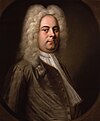Portal:Opera/Selected article/41
In 1703, the 18-year-old composer George Frideric Handel took up residence in Hamburg, Germany, where he remained until 1706. During this period he composed four operas, only the first of which, Almira, has survived more or less intact. Of the three lost Hamburg operas, the music for Nero is lost, while only short orchestral excerpts from Florindo and Daphne survive. Handel was born and grew up in Halle, where he received his early musical education and became an accomplished organist. In Hamburg he obtained employment as a violinist at the Oper am Gänsemarkt, the city's famous opera house. Here, he learned the rudiments of opera composition, mainly under the influences of Reinhard Keiser, the theatre's music director, and Johann Mattheson, its leading vocalist. The Gänsemarkt was largely dedicated to Keiser's compositions; his temporary absence in 1704 gave Handel his chance, and in quick succession he wrote Almira and Nero using librettos by Friedrich Christian Feustking. Almira was successful, Nero less so and was never performed after its initial run of three performances. Handel's final Hamburg operas, Florindo and Daphne, based on librettos by Heinrich Hinsch and originally conceived as a giant single entity, were not produced at the Gänsemarkt before Handel left Hamburg for Italy in 1706.

